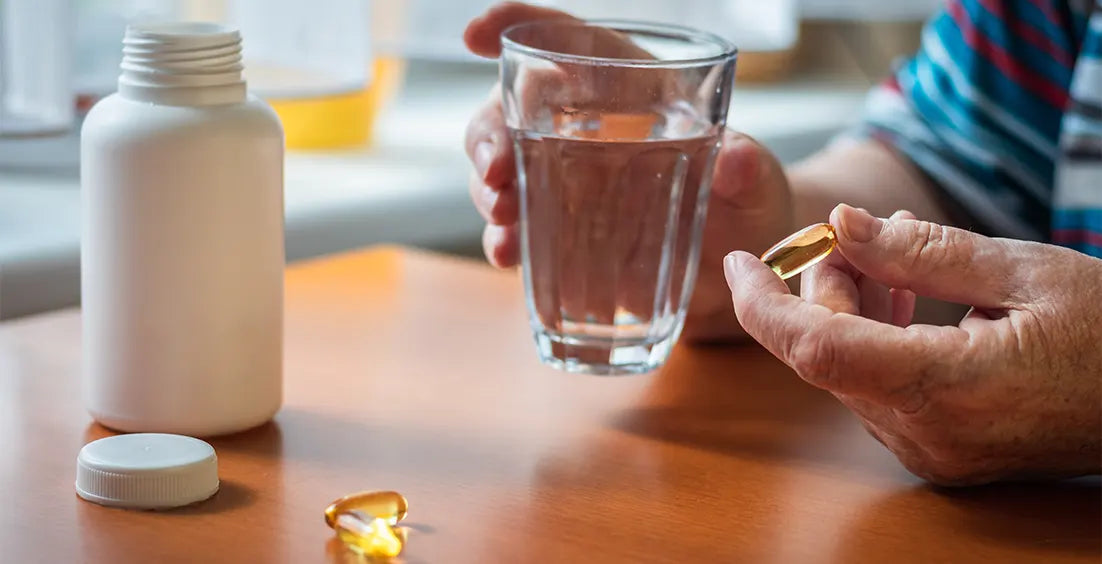Does Fish Oil Help Lower Your Cholesterol?
Uncover the effects of fish oil on cholesterol levels, its benefits for heart health, and whether omega-3 fatty acids can help reduce LDL and improve HDL.

The World's biggest killer is heart disease. Because of this scary discovery, many people choose dietary and supplement options to maintain a healthy heart. A vital supplement to support cardiovascular health is fish oil. This oil is rich in omega-3 fatty acids, which are popular for their anti-inflammatory abilities and cardiovascular benefits.
High cholesterol, specifically Low-Density Lipoprotein, can increase the chances of heart disease and stroke. Therefore, you must learn how to manage cholesterol to maintain cardiovascular health. While some people may decide to take supplements such as fish oil, others, in search of the best option, ask the question: does fish oil lower cholesterol? Or will fish oil help cholesterol?
This article answers the question: Is fish oil good for cholesterol? Is there fish oil for cholesterol reduction? Does fish oil help lower cholesterol? Does omega-3 lower cholesterol? We will also explore everything regarding omega-3 and cholesterol. Ready? Let's dive in.
What Is Cholesterol?
Cholesterol is a fatty substance found in the blood. Because your body has this substance, it can produce hormones that help you digest food and build cells. While cholesterol is the good thing our body needs to function, an excess can harm health. Cholesterol can attach itself to the walls of your artery, clogging and restricting blood flow. This restriction can cause stroke and heart disease.
Types Of Cholesterol
We have established that excess cholesterol is harmful to the body. However, this does not apply to all. Cholesterols can be divided into three types:
- HDL (High-Density Lipoprotein) This cholesterol is termed good cholesterol. It removes excess cholesterol from your bloodstream, decreasing your body's chances of having a heart-related disease.
- LDL (Low-Density Lipoprotein) High levels of Low-Density Lipoprotein in your body can accumulate to form plaque, which blocks the walls of your arteries.
- Triglycerides Triglyceride is a type of fat in your blood.
What Is Fish Oil?
Fish oil is obtained from the tissues of oily fish. Oily fishes are good sources of omega-3 acids, which are great for the wellness of the brain and heart. The best sources of fish oil are fatty fishes like sardine, salmon, tuna, Mackerel, Halibut, Anchovies, and Herring. Fish oil can be obtained from oysters, caviar (or roe), cod liver, and krill.
What Are The Main Components Of Fish Oil?
Many people consider fish oil good for health because it contains a good amount of omega3 fatty acids, specifically:
- Eicosapentaenoic Acid (EPA)
- Docosahexaenoic Acid (DHA).
This acid is known for its anti-inflammatory qualities. Eicosapentaenoic Acid (EPA) helps enhance blood flow, reduce triglycerides, and combat the possibility of heart disease.
The docosahexaenoic Acid is the main structure in the heart, brain, and retina. The DHA helps your cognitive function, reduces oxidative stress, and supports your heart.
Interestingly, the human body cannot produce these fatty acids. Therefore, it depends on meals and supplements to obtain them.How Is Fish Oil Different From Other Fats?
Trans fat and unsaturated fat can increase cholesterol levels, leading to heart disease. This case is not so with omega-3 acid. Here are other ways omega3 fatty acid differs from other fats
- Saturated fats in full-fat dairy, red meat, and butter can raise your 'bad' cholesterol, increasing your chances of heart disease.
- Trans fat:
- Monounsaturated and polyunsaturated fats:
- Omega3 fatty acid present in fish oil:
This kind of fat can be found in fried and processed foods. Trans fat harms the body and contributes to plaque that blocks the arteries.
This fat is present in seeds, nuts, and vegetable oil. Unlike previous fats mentioned, Monounsaturated and polyunsaturated fats are healthy and help to stabilize your body's cholesterol levels.
Omega-3 fatty acids are outstanding because they protect the heart. This fatty acid improves the flexibility of the artery and reduces triglycerides and inflammation. However, how the Omega-3 fatty acid directly impacts LDL and HDL is still debated.
How does Fish Oil Affect Cholesterol Levels
Fish oil is well known for reducing triglycerides and inflammation, contributing to heart health. However, how fish oil affects HDL and LDL can be complex. Some studies establish that fish oil can improve the level of cholesterol in the human body. Other studies maintain that fish oil may be ineffective in lowering the LDL, also called the bad cholesterol. If your LDL level is unhealthy, taking fish oil can lead to higher cholesterol levels.
Does Fish Oil Lower Low-Density Lipoprotein?
The impact of Fish oil on lowering the Low-Density Lipoprotein is not significant. However, for some individuals, there could be a noticeable increase.
What Is The Impact of Fish Oil on High-Density Lipoprotein?
High-density lipoprotein helps transport surplus cholesterol into the liver to be expelled. Studies show that taking fish oil can lead to a minute but good increase in the body's High-Density Lipoprotein level. However, this increase is not magnificent compared to adopting certain lifestyles, like eating healthy heart meals and regularly exercising.
Other Strategies For Lowering Cholesterol Level
Many people widely recommend you take Fish oil to reduce your cholesterol level. However, there are other effective strategies to accomplish this goal. These strategies can help you achieve a healthy heart and overall body wellness. To effectively protect your heart, try changes such as:
- Eating well-balanced diets:
- Regularly engaging in physical exercise helps increase HDL cholesterol and decrease the body's LDL cholesterol.
- Medications like satins are highly effective for reducing cholesterol LDL levels. Satins increase the liver's function to extract LDL from the blood and slow down the rate at which the liver produces cholesterol.
- Healthy habits like avoiding smoking, limiting alcohol consumption, and monitoring your weight can impact your cholesterol levels.
A well-balanced meal is essential for heart and body health. Eating more fiber-rich foods, such as beans, oats, fruits, and lentils, equips your body to combat diseases.
Instead of saturated fats, you can choose unsaturated fats from avocados, olive oil, and nuts.
You can also reduce your intake of sugary or processed foods. These foods contain trans fat and carbs, which increase your cholesterol levels.
Consuming plant-based foods like whole grains, fruits, legumes, and vegetables is a great option.
Advantages of taking fish oil
Fish oil has many benefits for the human body. Let's explore some of these benefits below.
- Fish oil is great for your heart:
- Fish oil improves brain and mental functioning
- Fish oil safeguards your eyesight
- Fish oil enables you to combat joint pains and inflammation
- Omega3 fatty acid improves your skin
- Fatty oil is beneficial for pregnancy and child development
One of the primary reasons people recommend fish oil is its benefits to the heart. As we established earlier in this article, the omega-3 fatty acids in fish oil reduce your chances of cardiovascular disease.
Omega 3 fatty acids help your mental cognitive function, enabling you to execute daily activities. Studies show that this fatty acid can improve your focus, memory, and overall brain performance. This is not all— early studies show that Fish oil can help decrease the symptoms of depression and anxiety by aiding neurotransmitter function.
Studies show that Omega3 can protect your vision by helping your body combat age-related macular degeneration (AMD). This fish oil can also keep your eyes moisturized and reduce irritation.
The inflammation property in fish oil makes it a perfect option for combatting swelling, stiffness, and pain in the joint and skin
Fish oil improves the appearance of skin by controlling acne and redness through anti-inflammation. This oil can also keep skin hydrated, improving its overall appearance.
Fatty oils are known for their benefits for pregnant women and their unborn children. The Docosahexaenoic Acid (DHA) in fish oil helps the baby's eyes and brain develop properly.
Also Read: How Much Fish Oil Should You Take?
Risks Associated with Fish Oil
While fish oil benefits the body, there are a few downsides. Here are some of them:
- Fish oil can cause digestive problems
- Fish oil causes bad breath.
Many people who take fish oil, especially in large quantities, complain of its negative reaction. Fish oil can cause abdomen upsets, diarrhoea, nausea, or indigestion. If you are starting to take fish oil, it is advisable to take it in small doses alongside food. This way, the discomfort is reduced.
Let's be frank—the smell of fish oil is not exactly the world's most sweet scenting supplement. After consuming fish oil, it is common to experience bad breath, burps, or a fishy aftertaste. It is important, however, that you choose good quality fish oil to reduce these problems. Some stores attach a 'fishy burp-free' to their fish oil capsules or pills to reduce this fishy smell. You may choose to try bulb-free fish oil pills for cholesterol.
Conclusion
Fish oil is a great option if you are looking for a good supplement or food to help you maintain a healthy heart. However, it is important to take a holistic approach to building a healthy life.
So, besides taking fish supplements, consider exercising regularly, eating well-balanced meals, and adopting other healthy habits. Before you begin taking fish oil, be sure to consult your Doctor.
This way, your prescription can be done according to your health condition, medical history, and medication. By properly understanding your options regarding Fish oil for cholesterol reduction, you can make the best choice for your heart health.
About WOWMD Staff
The WOWMD Staff category features a diverse team of writers, each bringing specialized knowledge in areas such as nutrition, fitness, wellness, and more. Articles in this category benefit from insights provided by multiple experts. All content is peer-reviewed and regularly updated to ensure compliance with our editorial standards.
References
- What Is Cholesterol? https://my.clevelandclinic.org/health/articles/23922-what-is-cholesterol
- Fish oil https://www.mayoclinic.org/drugs-supplements-fish-oil/art-20364810
- Health benefits and potential risks related to consumption of fish or fish oil https://pubmed.ncbi.nlm.nih.gov/14623484/
- Fish oil: friend or foe? https://www.health.harvard.edu/blog/fish-oil-friend-or-foe-201307126467
- At risk of high cholesterol? Taking fish oil may help https://news.uga.edu/fish-oil-supplements-fight-risk-of-high-cholesterol/amp/
- 6 common “heart-health” supplements ineffective at lowering cholesterol compared to statins https://newsroom.heart.org/news/6-common-heart-health-supplements-ineffective-at-lowering-cholesterol-compared-to-statins
- Omega 3 fatty acids for preventing or slowing the progression of age‐related macular degeneration https://pmc.ncbi.nlm.nih.gov/articles/PMC7087473/
- The effect of fish oil on blood pressure and high-density lipoprotein-cholesterol levels in phase I of the Trials of Hypertension Prevention. https://pubmed.ncbi.nlm.nih.gov/7769501/
- Effects of Omega-3 Polyunsaturated Fatty Acids on Brain Functions: A Systematic Review https://pmc.ncbi.nlm.nih.gov/articles/PMC9641984/
Evidence Based Research
This WOWMD content has been reviewed, as well as checked for facts, so as to guarantee the best possible accuracy.
We follow a strict editorial policy, especially related to the sources we use. Our articles are resourced from reputable online pages, with research drawn from academic institutions and peer-reviewed studies. You can click on the numbers in the parentheses (1, 2, etc.) and check out those references.
The feedback form on this page can be used to report content that is not accurate, up-to-date or questionable in any manner.
We do NOT intend for the information presented through our articles to replace the medical relationship with a qualified physician, nor does it represent specialized advice.


 Skin Detoxification Bundle
Skin Detoxification Bundle Complete Weight Loss Bundle
Complete Weight Loss Bundle Heart Care Bundle
Heart Care Bundle Better Immunity Bundle
Better Immunity Bundle  Men's Immunity & Prostate Health Bundle
Men's Immunity & Prostate Health Bundle Stress + Energy + Wellness Combo
Stress + Energy + Wellness Combo  Energy Booster Combo
Energy Booster Combo Natural Skin Care Bundle
Natural Skin Care Bundle Workout Supplements Combo
Workout Supplements Combo Cognitive Health & Vision Combo
Cognitive Health & Vision Combo Joint Health Support Combo
Joint Health Support Combo

















 By WOWMD Staff
By WOWMD Staff